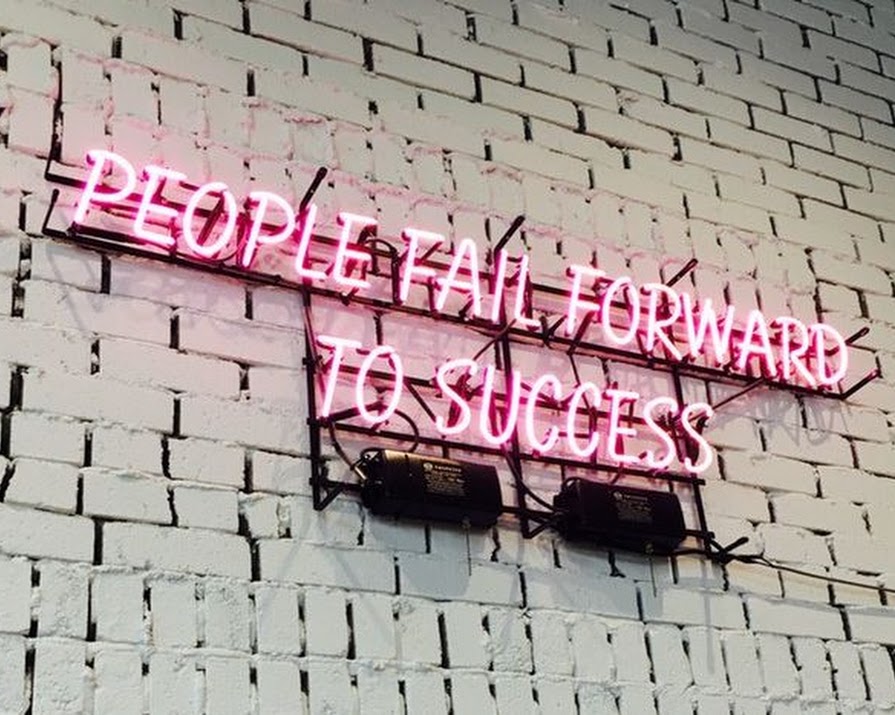
By IMAGE
22nd Jan 2019
22nd Jan 2019
Sarah Doyle is a life coach, co-founder of The Better Life Project and the creator of L-School for Women and The Empowered Women Workshop. Here, she gives us some advice on how to build your self-esteem by accepting failure.
The new year brings resolutions, goals, intentions and above all else, new possibilities for failure. This might sound gloomy at first, but there is a positive to giving ourselves permission to try and risk the possibility of failure. After all, we will learn more from our failures than we ever will from our successes. Accepting failure as a part of life and learning can lessen the negative self-talk that happens when we do fail.
I remember what feels like my biggest failure in life. It happened almost 17 years ago. Of course, there have been many, many more since but this one stuck. I won’t bore you with the details but suffice it to say, my 17-year-old tender and impressionable self-esteem only just remained intact.
According to the Oxford dictionary, self-confidence is having confidence in yourself and your abilities. When you lack confidence in yourself, it can feel all too easy to give up on your life goals as soon as you encounter a setback. For some of us, the pain of failure is so profound we struggle to recover our confidence. Our self-esteem is damaged, and an ever-growing feeling of doubt and insecurity further undermines our feelings of worthiness and competency. Our fear of failure starts a vicious cycle – we don’t want to fail, so we avoid even trying.
Is it better to have tried and failed, than never to have tried at all?
I have always been interested in why we are so obsessed with success, and so troubled by failure. Surely, to be preoccupied with success means that we have a healthy relationship with failure, but it would seem not. Our relationship to both is such that our lives revolve around our successes and people like me still talk about things we failed at after 17 years. Not only is a fear of failure an inbuilt physiological response to situations we may find threatening (being chased by a tiger, for example) but it is also a socially conditioned response. We have been conditioned to fear failure and to view it as a bad thing. A lot of people are scared of setting deadlines. Some people struggle with focus. Others struggle with confidence, and some people’s perfectionism gets the better of them and they spend a lifetime procrastinating. The vicious cycle begins yet again.
Failure is incredibly important. We speak about our success all the time but it is our ability to honour our commitments and goals instead of our fear of failure that is the real success. To recognise and acknowledge what is potentially holding us back and to create space in our lives to learn and grow undoubtedly leads to greater success. The truth of the matter is, failure is not failing. Some of the greatest minds of our time have failed; J.K. Rowling, Steve Jobs, Bill Gates, Albert Einstein, Abraham Lincoln, Michael Jordan, Steven Spielberg, Walt Disney. Googling any of these people will show you the monumental ways that they have picked themselves back up every single time they fell.
The only difference between successful people and unsuccessful people is that successful people will stand back up every single time they fall. Many of us have a fixed mindset about our abilities. If you try something and fail, you are unlikely to try again because you believe talent is something you are born with and that effort is temporary. This rigid mindset means that we are constantly limiting our ability.
Contrary to a fixed mindset, a growth mindset believes that abilities and skills can be learned and making the effort to push through setbacks is the most important thing. A growth mindset results in a desire to learn from failures, setbacks and more. Defeat, failure and setbacks are temporary states which are often made permanent by giving up. The power of passion and perseverance and an inherent curiosity in the “what if” will result in success. I promise.
When you give yourself permission to accept that failure is a normal part of growing up, you can start to normalise, even welcome, failure. Accepting failure as a part of life will empower you with freedom to try new things and escape your self-imposed limitations. Just keep swimming — you got this!
“Ever tried. Ever failed. No matter. Try again. Fail again. Fail better.”
– Samuel Beckett























